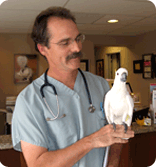Diet for a weaning African Grey parrot

I am from Bucharest/Romania and we don’t have well prepared avian vet. i have a baby african grey. he is 17-18 weeks. i bought him about one month and he is not weaned.now i am trying to wean him. i was to the vet with him for a test bcz his drops are wetly and the avian vet told me to feed him only with mango, apple, kiwi with seeds, baby wet formula, special bread, mix seeds, cow cheese. that’s all. without banana or other fruits, without vegi. how is possible? he needs a lot of vegi and fruits. please you can explain me what diet i can give to him? what food he can eat. and please, i beg you advice me what to do bcz i don’t know how the feces have to be. i read but i have no idea how is normally to be.
Best regards

Ideally, a pet parrot should be purchased fully weaned. With this, many of the health risks and behavioral problems that are encountered with the purchase of an unweaned bird can be avoided. Assuming that you are using a wet formula for handfeeding that is commercially manufactured, the same company should have a pelletized product available in your area. The diet you mentioned seems to be quite high in emphasized fruits, whereas we will generally recommend a combination of a commercially manufactured pellet with vegetables as the primary base. Cheese is generally not recommended as a daily portion of most parrot diets. In the absence of available commercially manufactured diets in your country, low-fat content seed mixtures, combined with vegetable material may be a somewhat acceptable base.
Young parrot chicks, particularly when not fully weaned, should pass more urine than their adult conterparts. During the weaning process, it is advisable to offer a variety of the food items that we are teaching the bird to eat on a large flat plate, and to forage with the birds while they are exploring their environment and social interactions with you. Afterwards, offer a small amount of handfeeding formula, if the bird desires.

































